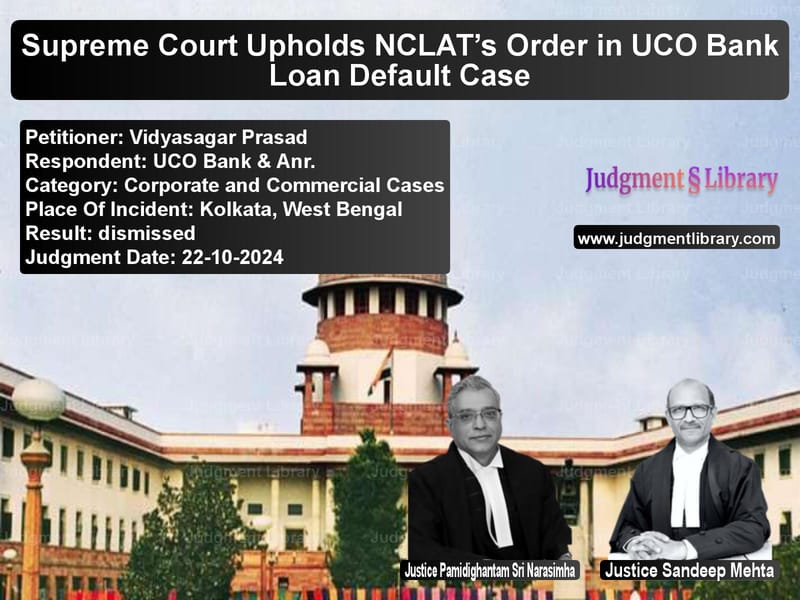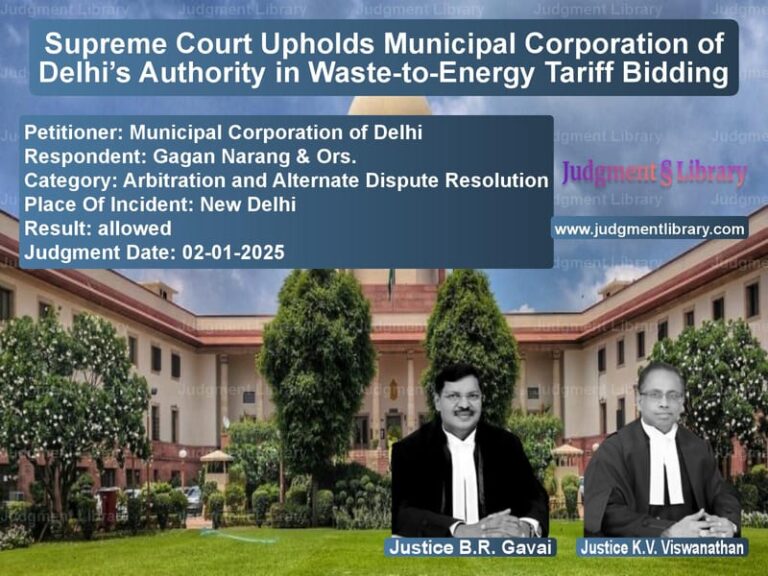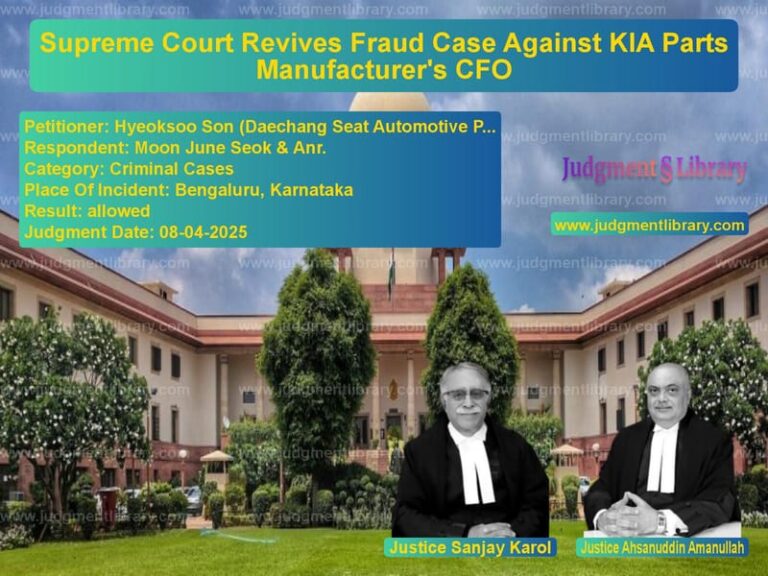Supreme Court Upholds NCLAT’s Order in UCO Bank Loan Default Case
The Supreme Court of India, in Vidyasagar Prasad v. UCO Bank & Anr., delivered a significant judgment on October 22, 2024, upholding the order of the National Company Law Appellate Tribunal (NCLAT) regarding the initiation of Corporate Insolvency Resolution Process (CIRP) against the corporate debtor. The Court ruled that the application under Section 7 of the Insolvency and Bankruptcy Code (IBC), 2016, filed by UCO Bank was within the limitation period, as the corporate debtor had acknowledged the debt in financial statements. This ruling clarifies the applicability of Section 18 of the Limitation Act, 1963, to insolvency proceedings.
Background of the Case
The case involved a corporate debtor that had availed loan and credit facilities from UCO Bank and a consortium of banks under agreements executed in 2010 and 2012. These funds were intended for setting up a thermal power plant. However, due to non-repayment, the corporate debtor’s account was declared a Non-Performing Asset (NPA) on November 5, 2014. Subsequently, UCO Bank initiated recovery proceedings under the Securitization and Reconstruction of Financial Assets and Enforcement of Security Interest (SARFAESI) Act and the Debts Recovery Tribunal (DRT).
Proceedings Before the NCLT and NCLAT
- On February 13, 2019, UCO Bank filed an application under Section 7 of the IBC before the National Company Law Tribunal (NCLT), Kolkata, for initiating CIRP against the corporate debtor.
- The corporate debtor opposed the application on three primary grounds:
- The application was time-barred due to the three-year limitation period.
- The application was not signed by a competent authority.
- There was no financial debt, as per the terms of the agreement.
- The NCLT rejected the corporate debtor’s objections and admitted the Section 7 application.
- The corporate debtor appealed before the NCLAT, which upheld the NCLT’s decision.
Petitioner’s Arguments (Vidyasagar Prasad)
The petitioner, suspended director of the corporate debtor, argued:
- The application under Section 7 was time-barred since the limitation period expired on November 5, 2017, three years after the account was classified as NPA.
- The balance sheets relied upon by UCO Bank did not contain a clear and unequivocal acknowledgment of debt.
- The acknowledgment of liability must be specific to the financial creditor; in this case, UCO Bank’s name was not explicitly mentioned in the financial statements.
- The bank’s reliance on an One-Time Settlement (OTS) proposal did not constitute an acknowledgment of debt.
Respondent’s Arguments (UCO Bank)
UCO Bank countered:
- The limitation period was extended due to acknowledgment of debt in the corporate debtor’s balance sheets.
- Under Section 18 of the Limitation Act, an acknowledgment in writing extends the limitation period.
- The balance sheets for the financial years ending on March 31, 2017, and March 31, 2019, confirmed that the corporate debtor had outstanding dues.
- The corporate debtor had issued an OTS proposal on June 7, 2016, which amounted to an acknowledgment of debt.
Supreme Court’s Analysis and Judgment
Acknowledgment of Debt Extends Limitation Period
The Supreme Court upheld the NCLAT’s findings, stating:
“The balance sheets of the corporate debtor contain a clear acknowledgment of debt, which extends the limitation period under Section 18 of the Limitation Act.”
OTS Proposal Constitutes Acknowledgment
The Court relied on precedents, including Lakshmirattan Cotton Mills Co. Ltd. v. Aluminium Corporation of India Ltd., to hold that:
“A One-Time Settlement proposal, even if not explicitly mentioning the exact nature of liability, indicates a jural relationship and an acknowledgment of liability.”
Balance Sheets as Acknowledgment
The Court cited its judgment in Asset Reconstruction Company (India) Ltd. v. Bishal Jaiswal to reinforce that:
“Entries in financial statements, though statutorily mandated, constitute acknowledgment of debt if they reflect outstanding liabilities.”
Key Takeaways from the Judgment
- Extension of Limitation Period: Acknowledgment of debt in balance sheets can extend the limitation period for initiating CIRP.
- Significance of OTS Proposals: A debtor’s offer to settle outstanding dues is considered an acknowledgment of liability.
- Importance of Section 18 of the Limitation Act: Financial creditors can rely on corporate debtor acknowledgments to file insolvency proceedings beyond three years from the date of default.
- Clear Precedent for Financial Institutions: The ruling provides clarity to banks on when to initiate CIRP proceedings.
Impact of the Judgment
- Boosts Creditor Rights: Strengthens the ability of financial creditors to recover debts through insolvency proceedings.
- Reduces Scope for Defaulting Borrowers to Evade Liability: Prevents debtors from avoiding repayment by claiming time-barred debts.
- Guidelines for Future IBC Cases: Establishes key principles for determining acknowledgment of debt.
Conclusion
The Supreme Court’s ruling in Vidyasagar Prasad v. UCO Bank is a landmark decision that reinforces the principles of debt acknowledgment and limitation in insolvency cases. By affirming that balance sheet entries and OTS proposals extend the limitation period, the judgment ensures that financial institutions can pursue recovery proceedings effectively under the IBC. This ruling sets a strong precedent in corporate insolvency law and provides much-needed clarity for financial creditors dealing with defaulting borrowers.
Petitioner Name: Vidyasagar Prasad.Respondent Name: UCO Bank & Anr..Judgment By: Justice Pamidighantam Sri Narasimha, Justice Sandeep Mehta.Place Of Incident: Kolkata, West Bengal.Judgment Date: 22-10-2024.
Don’t miss out on the full details! Download the complete judgment in PDF format below and gain valuable insights instantly!
Download Judgment: vidyasagar-prasad-vs-uco-bank-&-anr.-supreme-court-of-india-judgment-dated-22-10-2024.pdf
Directly Download Judgment: Directly download this Judgment
See all petitions in Bankruptcy and Insolvency
See all petitions in Corporate Compliance
See all petitions in unfair trade practices
See all petitions in Debt Recovery
See all petitions in Company Law
See all petitions in Judgment by P.S. Narasimha
See all petitions in Judgment by Sandeep Mehta
See all petitions in dismissed
See all petitions in supreme court of India judgments October 2024
See all petitions in 2024 judgments
See all posts in Corporate and Commercial Cases Category
See all allowed petitions in Corporate and Commercial Cases Category
See all Dismissed petitions in Corporate and Commercial Cases Category
See all partially allowed petitions in Corporate and Commercial Cases Category






